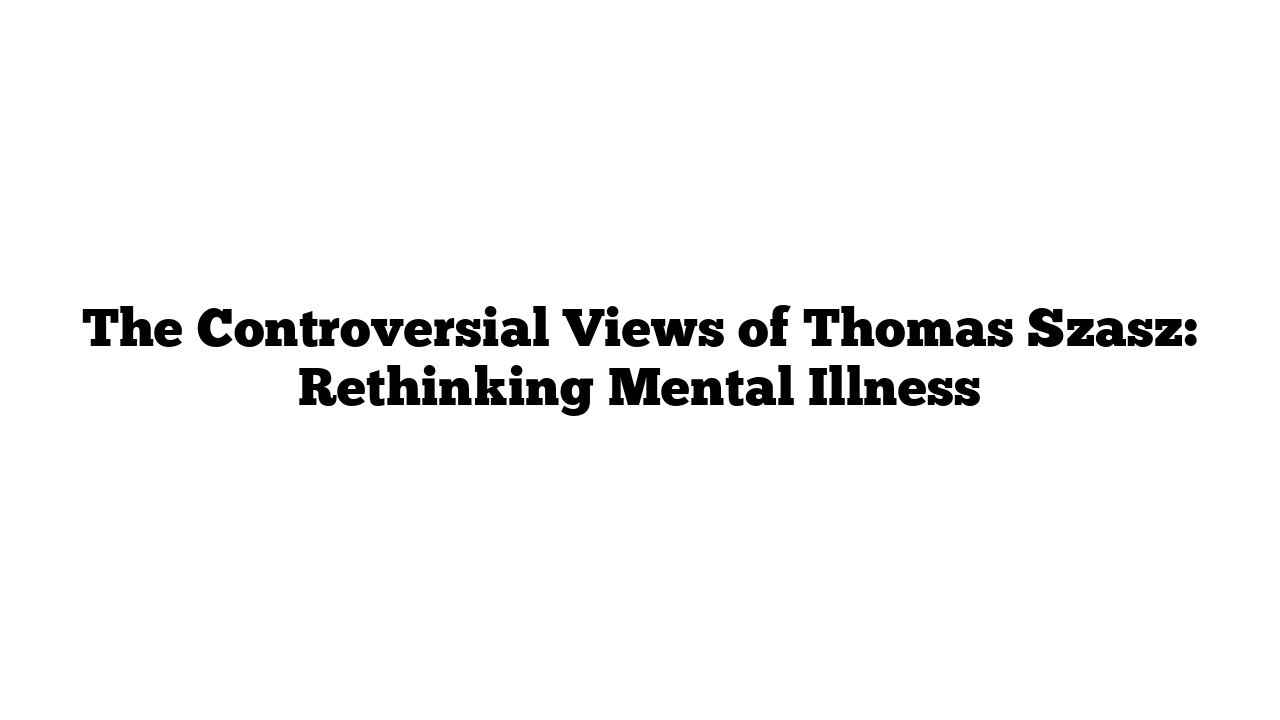Thomas Szasz is a name that often sparks debate in the world of psychiatry. A trained psychiatrist himself, he spent decades challenging the very foundations of the field, claiming that mental illness is a myth. His bold statements about involuntary psychiatric treatment likening it to slavery and advocating for a free market in psychiatric drugs have left many perplexed and intrigued.
Understanding Szasz’s Argument
Szasz gained significant attention with his groundbreaking book, The Myth of Mental Illness, published in 1974. In this work, he presented a compelling argument that distinguishes between medical disorders and psychological distress.
Medical vs. Psychiatric Diagnosis
In traditional medical fields, doctors diagnose illnesses based on identifiable bodily causes. For instance, if you visit a doctor with chest pains, they can conduct tests, like x-rays or blood work, to determine the root of the problem. The distinction lies in the fact that psychiatrists, according to Szasz, do not have such a luxury. Instead, they operate primarily on symptoms.
Here’s how Szasz articulates this idea:
“To speak of elevated blood pressure and diabetes all as organic symptoms and to place them in the same category as hysterical pains is a misuse of language.”
This perspective suggests that conditions like ADHD, depression, or schizophrenia are not genuine illnesses but rather problems of living that require understanding and compassion rather than medical intervention.
The Role of Therapy
Szasz believed that many individuals experiencing what we term mental illnesses could benefit greatly from talk therapies or mindfulness practices. Unlike physical ailments, where direct physiological treatment is necessary, psychological issues can often be addressed through dialogue and understanding.
For example, talk therapy can significantly impact individuals suffering from anxiety or depression, emphasizing the importance of addressing thought patterns rather than simply treating symptoms with medication.
Criticism of Szasz’s Views
Despite his compelling arguments, Szasz has faced substantial criticism. Some claim he offers a limited understanding of medicine and psychiatry. Critics argue that not all medical conditions have identifiable causes, citing examples like migraines or fibromyalgia—conditions that are diagnosed based on symptoms rather than physical markers.
Moreover, advancements in neuroscience have identified genetic factors linked to various mental disorders, including schizophrenia. Critics of Szasz also point out that many psychiatric disorders can benefit significantly from medical treatments, raising the question of whether these issues can truly be considered “problems of living.”
The Ethical Dilemma of Involuntary Treatment
One of Szasz’s most provocative claims is his opposition to involuntary treatment. He compared the practice to witch hunts and slavery, suggesting that forcing someone into treatment strips them of their autonomy.
“The institutional psychiatrist accuses the citizen of mental illness, just as the Inquisitor once accused a citizen of witchcraft.”
Szasz argued that such practices are not grounded in science but are instead methods of social control.
Rethinking Mental Health Treatment
So, what does Szasz propose instead? He believes that therapy should focus on communication and understanding rather than diagnosis and treatment. The relationship between a therapist and a client should be built on mutual respect and empathy, allowing individuals to express their struggles without the stigma of being labeled as “ill.”
Emphasizing Personal Agency
Szasz also emphasizes the need for therapists to align with their clients rather than societal or institutional pressures. When therapists act as agents of the state or insurance companies, they risk prioritizing societal norms over the individual’s needs.
For instance, in the USA, children who struggle with school may be diagnosed with ADHD instead of addressing the educational environment that might not cater to their learning styles. This approach can lead to unnecessary labeling and treatment.
Challenging Societal Norms
Szasz’s ideas challenge us to rethink how we define mental health. Are we treating genuine mental illnesses, or are we simply responding to behaviors that society finds inconvenient? His criticisms serve as a wake-up call, urging us to consider the ethical implications of our current psychiatric practices.
Reflecting on Szasz’s Legacy
Regardless of where you stand on Szasz’s ideas, his work encourages us to rethink our approach to mental health. He inspires a critical look at psychiatry, pushing for a more empathetic and understanding framework.
By examining the boundaries of psychiatry, we can open up discussions about individual freedom, social norms, and mental well-being.
For further insights into the intersection of mental health and societal expectations, check out these articles:
- Understanding ADHD: More Than Just a Diagnosis
- The Ethics of Involuntary Treatment: A Necessary Debate
- Rethinking Mental Illness: What Does It Mean for Us?
If you want to explore more about these topics and stay informed, visit medicaltimes.io for the latest in health and medicine.
